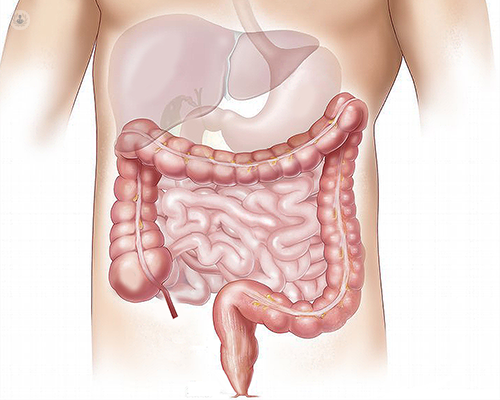How bowel cancer treatment changes your life
Written by:You’ve had bowel cancer treatment, so what life-changing aspects can be expected? Renowned consultant general and colorectal surgeon, Mr Alexander von Roon, covers what you need to know about post-treatment for bowel cancer in this article following his three others in this series.

What impact will bowel cancer treatment have on a patient’s life?
This depends very much on where in the bowel the cancer is located and how advanced it is.
If chemotherapy is required (this is usually determined by the results of the examination of the removed bowel by a pathologist and the process takes around two weeks), this is usually given for six months. In most cases, a line accessing the central veins in the body is placed (port-a-cath or Hickman line) and the patient attends on two consecutive days of one week for blood tests and infusion of the chemotherapy, with a one or two week break afterwards before repeating the process. This is called a ‘chemotherapy cycle’.
If an ileostomy needs to be made in some cases, the patient needs to look after it for three or six months depending on whether chemotherapy is required. Many people find the initial period of adapting to having a stoma difficult, as it has a large impact on their body image and they find the process of caring for an ileostomy distasteful. Thankfully, most people get used to the ileostomy quite quickly, and how they feel about it often changes with time.
If a colostomy is made, this is usually permanent, and although most people are reconciled to having a colostomy after a period of time, some continue to find it difficult.
If the colon is joined to the rectum during surgery for left sided bowel cancer or rectal cancer, the bowel function is usually altered in the long-term. If an ileostomy is made, this change only happens once the ileostomy is closed. People find that they usually have to open their bowels more frequently than before (two to three times a day in most cases), often soon after eating a meal, and that they have to visit the toilet more urgently than previously. This usually improves with time, but in some cases, the urgency can be quite severe and also be associated with clustering of stools (having to go several times in quick succession) and a feeling of not being able to empty the bowel completely. This is called the low anterior resection syndrome. It is usually worse where a larger proportion of the rectum is removed and a ‘low’ join (or anastomosis) of the colon to the remaining rectum is made. Rarely, it can lead to faecal incontinence. Non-surgical treatments are available to make the symptoms better, although they often don’t go away completely.
In around five per cent of cases, injury to the pelvic nerves can occur during surgery or as a result of having received radiotherapy before surgery. These nerves supply the bladder and also control erections. Some patients can have difficulty with an unstable bladder or erections after surgery for rectal cancer.
What lifestyle changes are bowel cancer survivors required to make?
People who recover from right-sided bowel cancer usually do not need to make significant lifestyle changes apart from having their surveillance investigations done every six to twelve months. People who have surgery for left-sided or rectal cancer sometimes need to make changes to their diet such as avoiding high-fibre foods if they suffer from the low anterior resection syndrome. A few people need to wear incontinence pads in the long term for added protection in case they have severe urgency and can’t get to a toilet on time. Some people need to take loperamide (also known as Imodium) to make their stools harder. If a pelvic nerve injury occurs, some men need to take Viagra or similar medication to help with erections, or use other aids to achieve erections. If a permanent stoma is required as part of bowel cancer treatment, this also requires a lifestyle adjustment for some people apart from caring for the stoma, for instance needing to eat their evening meal earlier to prevent the stoma from becoming too active overnight.
If you have concerns about your bowels or have recently had bowel cancer treatment, do not hesitate to book a consultation with Mr Alexander von Roon via his Top Doctors profile today to receive expert advice.



